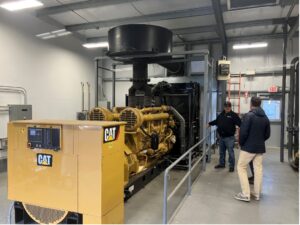
It’s no surprise that consumers want their power to be reliable and affordable, a duo of attributes that are challenging to balance and achieve anywhere – and notoriously difficult on an island or at the end of long radial power line.
In our fourth year as regional partner for the Energy Transitions Initiative Partnership Project (ETIPP), Island Institute has been busy identifying and evaluating solutions that achieve just those very goals with our community partners and national lab collaborators. Through ETIPP, each year, Island Institute brings on a cohort of island or rural/remote to work on community-specific energy resilience over a 12-18 month timeframe.
We’re gearing up to bring our fourth cohort of communities into the program this spring and summer. Communities can work with Island Institute to develop project ideas, materials, and community support for their applications. Once accepted, community teams will start by further refining their strategic energy planning and technical assistance needs with national lab partners.
Our Cohort 3 communities who started in 2023 have spent the last few months onboarding and defining the statements of work that will guide the technical assistance provided by national lab partners.
- Deer Isle & Stonington (ME) will model various microgrid scenarios at varying levels of detail as the project progresses, which will be used to develop an energy roadmap.
- Edgartown, Oak Bluffs, and Tisbury on Martha’s Vineyard (MA) will develop a water distribution network model to identify key resiliency risks and provide recommendations for power and water system upgrades.
- Block Island (RI) will develop a roadmap to 2040, incorporating community-scale renewable energy resource assessment and cost analyses for various scenarios, in addition to supporting the development of a community solar pilot program.
- Shelter Island (NY) will be conducting a renewable energy resource assessment with a focus on adding resilience to critical infrastructure.
Our Cohort 2 communities who started in 2022 are digging deep into technical analyses they defined and collaborated on with national lab partners.
- Aquinnah and Chilmark on Martha’s Vineyard (MA) are exploring community microgrid design options, examining various distributed energy technology and building configurations to bring into this energy resilience tool.
- The four towns of Mount Desert Island (ME) are evaluating areas to prioritize for “resilience hubs” and designing a microgrid to support resilience at the identified asset cluster.
- Beaver Island (MI) is completing a renewable energy resource assessment and, building off their findings, are developing a strategic energy plan.
Our Cohort 1 communities who started in 2021 have offboarded from the program and continue to advance the goals identified in their ETIPP projects.
- Isleboro (ME) assessed environmental hazards, opportunities for load reduction & increased on-island generation, evaluated a series of microgrid scenarios, and developed an implementation roadmap. Isleboro’s Energy Committee was awarded an Energizing Rural Communities Prize to hire Energy Coordinator, Kizzi Barton, to implement priorities outlined in the roadmap, including the development of Isleboro’s Energy Hub and performing home energy assessments in the short-term.
- Eastport (ME) developed two scenarios for solar, storage, and tidal microgrids and evaluated energy savings potential of residential energy efficiency projects. Through Island Institute, Eastport was awarded an Energizing Rural Communities Prize to continue stakeholder engagement in support of these efforts.
Across the board, many ETIPP communities are learning more about the energy options available to them -through resource assessments, feasibility studies, cost-benefit analyses, or roadmap development- and using their learnings to build plans for their energy future. ETIPP communities also recognize that a lack of energy resilience can create real hardship, but investing in energy upgrades can also be an economic challenge. As such, reducing energy burdens is a common thread across many ETIPP projects. These projects seek to evaluate the benefits of resiliency tools like “resilience hubs” and low-cost home energy efficiency upgrades.
Let’s face it, understanding energy systems can sometimes feel like more of a complex engineering challenge than an avenue for community self-determination and sustainability. Because of this, deep community education and engagement on project goals and outcomes has been a thread across all ETIPP communities. This past fall and winter, we’ve had opportunities to gather in person with community partners and national lab collaborators on Block Island, Shelter Island, MDI, and Deer Isle & Stonington. These visits were opportunities for community members to participate in information and question sessions and for ETIPP team members to tour existing infrastructure and potential project sites.
Island Institute also has a few new faces on the clean energy team supporting the ETIPP program! In August, Jamie Cook joined Island Institute, bringing a wealth of experiences working in the utility and facilities management industries in Hawai’i, Massachusetts, and Maine to his role as Senior Community Development Officer. Community Development Officers Kate Klibansky and Brenna Cohen were promoted to the team this November and December, respectively. Marie Caspard joined Island Institute in January, bringing experience in resource assessment, GIS, and community engagement at a marine renewable energy developer.
The program is far from over, too! In fact, Island Institute was recently awarded a two-year contract extension to continue serving as regional partner for the Northeast. ETIPP is open to any municipal, county or tribal government, special purpose district, small utility or community organization. Whether you’re just interested in learning more about Island Institute’s clean energy work or looking to apply to ETIPP Cohort 4, please reach out to Jamie Cook, Senior Community Development Officer (jcook@islandinstitute.org).

